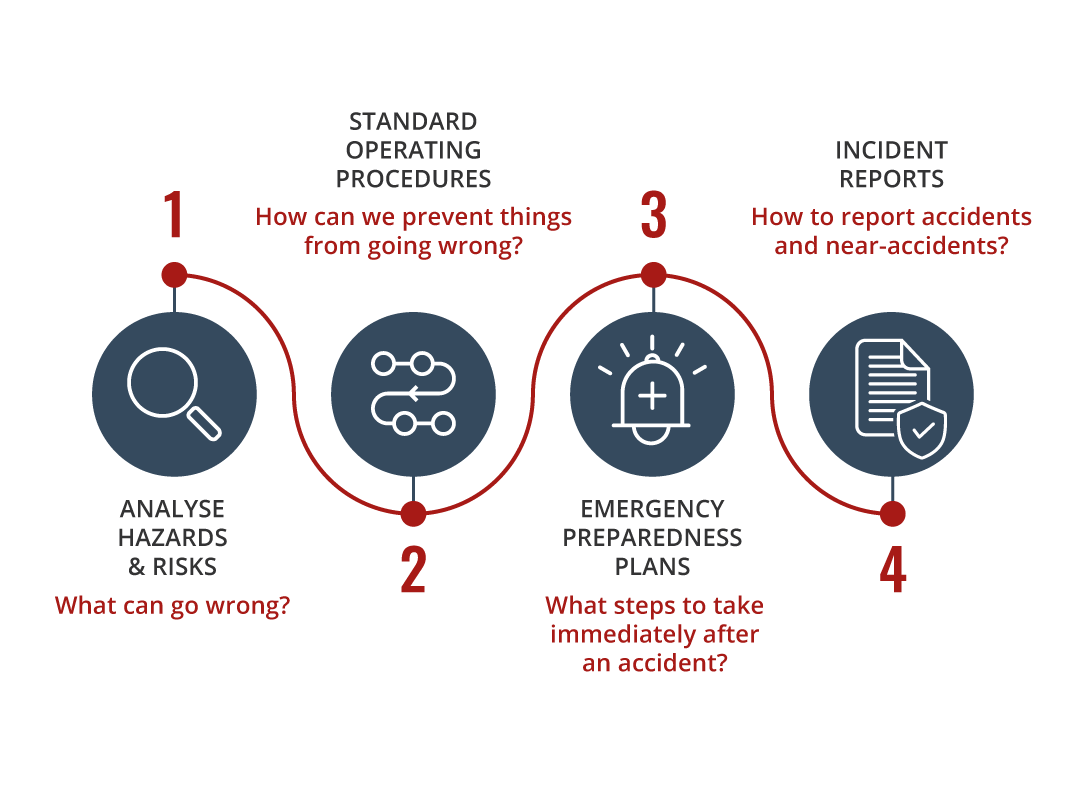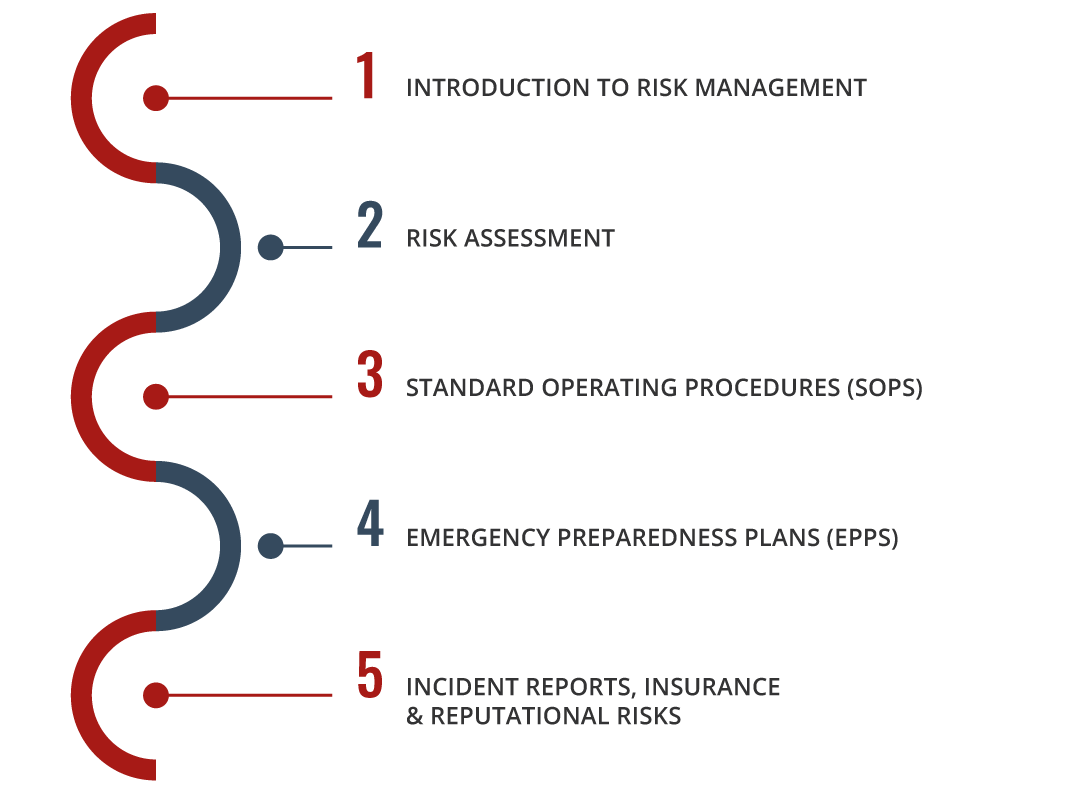Risk Management Training
The online training on Risk Management provides an easy and practical introduction to risk management for tourism products. The training enables familiarity with a basic risk management system and its components and provides the know-how and tools necessary to create a simple yet effective system.
The Risk Management online training is based on the experiences, examples and tools of VAKINN, the official quality and environmental system within Icelandic tourism. The training program will also refer to experiences of New Zealand’s reform process in the adventure industry and resources of APEC International Center for sustainable Tourism.

What is a basic risk management system?

A basic risk management system can roughly be divided into four components
1. The first component is the risk assessment
Risk Assessment is the process in which the risk of a hazard occurring is evaluated and the availability and efficiency of control measures are considered. Assessed risks are defined as acceptable or not for specific types of tours. Risk assessment includes:
- identifying risk factors/hazards
- assessment of the likelihood that the hazard will occur and the seriousness of the consequences of such an event
- evaluation of whether the risk is within acceptable limits set by the operator, national laws, tourists and/or international standards
Questions that the risk assessment aims to answer:
- What consequences could the activity have?
- How serious are these consequences?
- What is the likelihood of them occurring? Is the risk acceptable?
2. The second component addresses standard operating procedures (SOPs)
SOPs are documented set of instructions that define the rules-control points for staff to complete certain operational tasks with the aim to ensure safety in organization operations and uniformity in its practices. SOPs primarily deal with prevention.
Example questions relevant to ask when designing SOPs:
- What procedures should staff have in place in order to minimize risks?
- What training should they have? What equipment do they require?
- What should the staff/tourist ratio be?
3. The third component involves emergency preparedness plans (EPPs)
EPPs are a set of instructions/actions used by staff/tour personnel to efficiently manage and minimize the damage in case of emergencies and accidents. EPPs come into play when, despite careful preparations, an accident/emergency has occurred. EPPs are developed beforehand for specific type of tours and emergencies.
Example questions to consider when developing EPPs:
- What are the immediate steps that staff should take if a certain kind of accident happens?
- Which national/regional emergency numbers do staff need?
- Which steps need to be taken to ensure safety of remaining tourists?
4. The final component addresses incident reporting
Incident reports are a reporting tool for recording the almost accidents, incidents and accidents experienced by staff, supplier staff or tourists during the organizational operations. They are gathered and used for continuous reassessment of risks with the aim of managing/mitigating risks.
How is the training set up?

The “Risk Management Training” consists of 5 courses. In addition to a general introduction on risk management (Course 1), each course is dedicated to a different component of the basic risk management system described above.
Each course module features two practical video presentations (each less than 30 minutes in length) by different presenters to enable participants to learn from sector experts.
Each course module ends with a short practical assignment. Helpful templates are provided and can be downloaded. The completed assignments and potential post-course questions should be sent to riskmanagement4tourism@gmail.com to be reviewed, evaluated and answered by international experts and GIZ.
Training certificate
Participants who complete the required modules and the corresponding practical assignments to a satisfying degree will be awarded with a training certificate.
This certificate can be used to illustrate risk and safety skill enhancement. Tour Operators can use the certificate for communication purposes such as signalling safety commitment to partners and clients. Tour operators that have obtained the certificate can also apply for on-the-ground coaching by national and international experts to facilitate the implementation of their risk management plans.
Free registration
Accessing the online course only requires a short, easy and free registration. After registering, a GIZ confirmation email will send you a password (this may take around 10 minutes).
[register_or_link register="Register!" link="All our Courses" href="/all-courses/"]
FAQ
Who can benefit from the online training?
The online training is in the forefront targeting DMCs and will enable them to set up a risk management system tailored to their individual needs, travel products and local circumstances. Additionally, various tourism practitioners (such as guides, tourism faculty students..) can benefit from the online training through increased risk awareness and risk management capabilities.
Which requirements and prior knowledge do I need for participating in the training?
There is no prerequisite for the participation in the online training, except the necessary registration (free of charge) on this website. Prior knowledge on risk management is not required for participation. A basic introduction and all the information necessary are provided in each course. A gasp of the tourism sector, in particular through practical experience, is nevertheless useful to fully benefit from the online training.
For what does the training prepare the participants?
The online training provides participants with a first introduction into risk management of tourism products. The familiarity with the different components, methods and tools will enable participants to systematically assess operational risks and develop various measures to manage and mitigate risks.
How long will it take to complete the course?
The duration of the online training is very customizable and will largely depend on participants individual time availability, speed and degree of immersion. The video presentations are less than 1 hour for each course and a similar time will be necessary to finalize the assignments. Thus, the online training can theoretically be completed in 2 days and easily in 1 week.
Must I attend the training courses in the specified order?
The different courses are constitutive and each course represents an important step in the development of a basic risk management system. We thus recommend completing the online training in the specified order.
